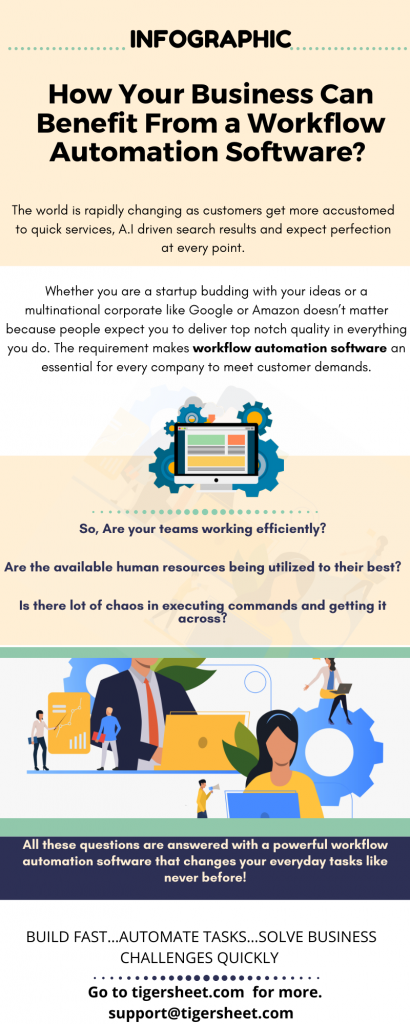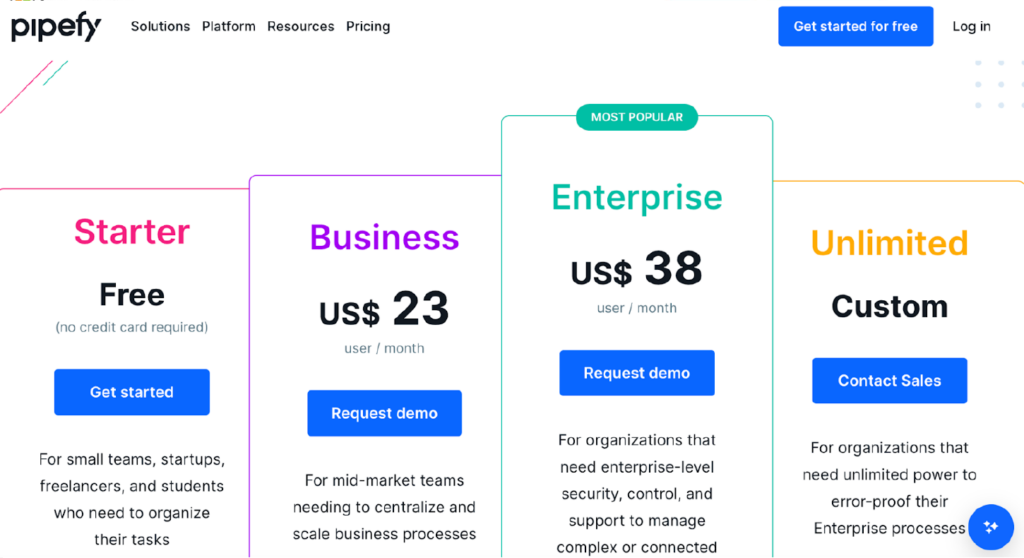Business workflow automation software helps startups streamline processes and save time. It boosts efficiency and reduces manual errors.
Startups face many challenges, including limited resources and tight budgets. Business workflow automation software can be a game-changer. It automates repetitive tasks, freeing up valuable time for critical activities. This software helps in organizing work, managing projects, and enhancing team collaboration.
Startups can scale faster and handle more projects without hiring more staff. The automation also reduces errors, ensuring smoother operations. By integrating various tools, it provides a comprehensive solution to manage different aspects of business. This smart investment can lead to significant growth and success for startups.

Credit: www.linkedin.com
Introduction To Workflow Automation
Startups often face numerous challenges in their early stages. One crucial aspect is managing their business processes efficiently. Workflow automation can be a game-changer. It helps streamline operations, saving both time and resources. Let’s dive into the basics of workflow automation and its importance for startups.
What Is Workflow Automation?
Workflow automation involves using software to automate repetitive tasks. It helps businesses run smoothly without human intervention. This software ensures tasks are completed accurately and on time.
Here are some key features of workflow automation:
- Automates repetitive tasks
- Reduces human errors
- Enhances productivity
- Improves communication
Importance For Startups
For startups, workflow automation is crucial. It helps in several ways:
| Benefits | Description |
|---|---|
| Time-saving | Automates tasks, freeing up time for critical activities. |
| Cost-effective | Reduces the need for additional staff. |
| Scalable | Grows with your business needs. |
| Consistency | Ensures tasks are done the same way every time. |
Startups can greatly benefit from workflow automation. It allows them to focus on growth and innovation. By automating mundane tasks, startups can allocate resources more efficiently.
Key Benefits
Business workflow automation software offers significant advantages for startups. These benefits can transform how new businesses operate, enhancing efficiency and productivity. Below, we discuss some of the key benefits of using such software.
Time Savings
Automation software saves valuable time for startups. Repetitive tasks like data entry and email responses can be automated. This allows team members to focus on strategic activities.
Consider the hours spent on manual tasks weekly. Automation can reduce this by up to 50%. This time can be reallocated to innovation and growth.
Time savings translate to cost savings. The resources saved can be used for other critical business areas.
Improved Accuracy
Manual processes are prone to errors. Automation reduces these errors significantly. Automated workflows ensure that tasks are completed correctly every time.
Improved accuracy leads to better data quality. Accurate data is crucial for making informed decisions. This can be a game-changer for startups.
Automation also ensures compliance. Consistent processes help maintain standards and regulations. This reduces the risk of non-compliance penalties.
| Benefit | Description |
|---|---|
| Time Savings | Reduces time spent on repetitive tasks. |
| Improved Accuracy | Minimizes errors and enhances data quality. |
Essential Features
Business workflow automation software is crucial for startups. It helps streamline operations, save time, and increase efficiency. Startups can focus on growth while the software handles repetitive tasks. Understanding the essential features of such software is key to choosing the right tool.
Task Management
Task management is a core feature of workflow automation software. It ensures that all tasks are organized and tracked efficiently. Look for software that offers:
- Task assignment
- Due dates
- Status tracking
- Prioritization
These features help teams stay on top of their work. It reduces the chances of missing deadlines. A user-friendly interface is also essential. It makes it easy for team members to manage tasks without any hassle.
Integration Capabilities
Integration capabilities are vital for any workflow automation software. Startups often use multiple tools for various purposes. Seamless integration with these tools ensures a smooth workflow. Key integrations to look for include:
- Email platforms (e.g., Gmail, Outlook)
- Project management tools (e.g., Trello, Asana)
- Communication tools (e.g., Slack, Microsoft Teams)
- CRM systems (e.g., Salesforce, HubSpot)
These integrations help centralize all your work in one place. It reduces the need to switch between different applications. This saves time and increases productivity. Ensure the software supports API access for custom integrations.

Credit: tigersheet.com
Choosing The Right Software
Choosing the right Business Workflow Automation Software is crucial for startups. The right software streamlines processes, boosts efficiency, and supports growth. This section will help you make an informed choice by focusing on two critical factors: Budget Considerations and Scalability.
Budget Considerations
Startups often have limited resources. Finding affordable software is essential. Here are some tips for managing your budget:
- Compare prices of different software options.
- Look for free trials or freemium versions.
- Check if the software includes all necessary features.
- Consider the total cost of ownership, including upgrades and support.
Use the following table to compare software options based on budget:
| Software | Price | Free Trial | Key Features |
|---|---|---|---|
| Software A | $50/month | Yes | Task management, Reporting |
| Software B | $30/month | No | Automation, Analytics |
| Software C | $70/month | Yes | Collaboration, Integration |
Scalability
Startups grow quickly. Your workflow software should grow with you. Consider these points:
- Does the software handle increased workloads?
- Can it integrate with other tools as your needs evolve?
- Does the provider offer scalable pricing plans?
- Is there an option for adding more users easily?
Scalable software ensures you won’t need to switch tools as your business expands. This saves time and reduces disruptions.
Choosing the right software impacts your startup’s efficiency and growth. Consider budget and scalability carefully.
Implementation Tips
Implementing business workflow automation software can be a game-changer for startups. It enhances efficiency, reduces errors, and streamlines operations. However, to maximize these benefits, careful implementation is key. Below are some valuable tips to ensure a smooth transition.
Team Training
Training your team is crucial for successful implementation. Ensure everyone understands how to use the software. Conduct regular training sessions and provide hands-on practice. This helps in building confidence and reducing resistance to change.
| Training Method | Benefits |
|---|---|
| Workshops | Interactive learning experience |
| Online Tutorials | Flexible and accessible |
| One-on-One Sessions | Personalized guidance |
Regular feedback from team members is also important. It helps in identifying and addressing any issues early on. Encourage open communication and support throughout the training phase.
Gradual Rollout
A gradual rollout minimizes disruption. Start with a pilot phase involving a small group of users. This allows you to test the software in a controlled environment. Gather feedback and make necessary adjustments before a full-scale launch.
- Identify key users for the pilot phase.
- Monitor performance and gather feedback.
- Make necessary adjustments based on feedback.
- Gradually expand to the entire team.
During the rollout phase, continuous support is essential. Provide a dedicated support team to address any issues promptly. This ensures a smooth transition and maintains productivity.
Popular Tools
Startups thrive on efficiency and speed. Business workflow automation software can help achieve these goals. Below are some popular tools that can streamline your processes.
Tool A Overview
Tool A is a versatile platform designed to automate various business tasks. It offers a range of features ideal for startups.
- Task Management: Automate repetitive tasks with ease.
- Integration: Connect with other apps for seamless workflows.
- Analytics: Gain insights to improve your processes.
Here’s a quick overview of its main features:
| Feature | Description |
|---|---|
| Task Management | Automate daily tasks and save time. |
| Integration | Connect with over 100+ apps. |
| Analytics | Track performance and optimize workflows. |
Tool B Overview
Tool B is known for its user-friendly interface and powerful automation capabilities. It’s perfect for startups looking to scale quickly.
- User-Friendly: Easy to set up and use.
- Customizable: Tailor workflows to your specific needs.
- Support: 24/7 customer support available.
Below is a breakdown of its key features:
| Feature | Description |
|---|---|
| User-Friendly | Simple setup and navigation. |
| Customizable | Adjust workflows to fit your needs. |
| Support | 24/7 customer support available. |
Measuring Success
Measuring the success of business workflow automation software is vital. Startups need to know their efforts are paying off. Tracking the right metrics helps determine this. It also guides improvements and future strategies.
Key Metrics
Key metrics are essential to measure success. They give clear insights into the software’s impact. Here are some important ones:
- Time Savings: Measure the time saved by automation.
- Cost Reduction: Track the decrease in operational costs.
- Accuracy Improvement: Calculate the reduction in errors.
- Employee Productivity: Monitor the increase in productivity.
- Customer Satisfaction: Assess improvements in customer feedback.
Continuous Improvement
Continuous improvement is crucial for long-term success. Regularly reviewing and refining processes ensures optimal performance. Here are some steps to follow:
- Regular Audits: Conduct audits to identify areas for improvement.
- Feedback Loops: Create feedback loops with employees and customers.
- Update Software: Keep the software updated with the latest features.
- Training: Provide ongoing training to employees.
- Benchmarking: Compare performance against industry standards.
Following these steps helps maintain efficiency and effectiveness. It ensures the business workflow automation software delivers consistent value.
Case Studies
Understanding the real-world impact of business workflow automation software on startups can be insightful. Let’s explore two success stories that showcase how startups have transformed their operations using automation tools.
Startup Success Story 1
Challenge:
- Handling a high volume of customer inquiries
- Manual data entry tasks
- Inconsistent customer service response times
Solution:
- Implemented automated customer support systems
- Integrated data entry automation
- Streamlined customer service processes
Results:
| Metric | Before Automation | After Automation |
|---|---|---|
| Response Time | 24 hours | 2 hours |
| Data Entry Errors | 15% | 2% |
| Customer Satisfaction | 60% | 90% |
Startup Success Story 2
Challenge:
- Inefficient project management
- Time-consuming scheduling tasks
- Difficulty tracking project progress
Solution:
- Adopted automated project management tools
- Used scheduling automation software
- Implemented progress tracking systems
Results:
| Metric | Before Automation | After Automation |
|---|---|---|
| Project Completion Time | 45 days | 30 days |
| Scheduling Time | 5 hours/week | 1 hour/week |
| Project Tracking Accuracy | 70% | 95% |
Future Trends
As startups evolve, they must adapt to changing trends. Business workflow automation software is no exception. Future trends will shape how startups operate and grow. Let’s explore some key trends in this space.
Ai Integration
AI integration in business workflow automation is a game-changer. AI can streamline tasks and improve efficiency. For startups, this means faster decision-making and reduced errors.
AI tools can analyze large amounts of data quickly. This helps in identifying patterns and making predictions. Startups can leverage this to stay ahead of competitors.
| AI Feature | Benefit |
|---|---|
| Natural Language Processing (NLP) | Improves communication and understanding. |
| Machine Learning | Enables predictive analytics. |
| Robotic Process Automation (RPA) | Automates repetitive tasks. |
Remote Work Adaptations
Remote work is now common in startups. Workflow automation software must adapt. New features are being developed for remote teams.
Collaboration tools are essential for remote work. These tools help teams stay connected and productive. Integration with video conferencing and chat apps is crucial.
- Task Management: Track tasks from anywhere.
- Time Tracking: Monitor work hours remotely.
- Cloud Storage: Access files from any location.
Remote work adaptations also include security features. Protecting data is vital for startups. Features like two-factor authentication and encryption are becoming standard.

Credit: www.sweetprocess.com
Frequently Asked Questions
What Is Business Workflow Automation?
Business workflow automation uses software to streamline repetitive tasks. It improves efficiency, reduces errors, and saves time. Startups can benefit greatly.
Why Do Startups Need Workflow Automation?
Workflow automation helps startups by saving time and reducing manual errors. It streamlines processes, allowing teams to focus on growth.
How Does Automation Software Improve Efficiency?
Automation software improves efficiency by handling repetitive tasks quickly and accurately. This allows employees to focus on more critical tasks.
What Features Should Startups Look For?
Startups should look for features like task automation, integration capabilities, and scalability. These features ensure the software grows with the business.
Conclusion
Boost your startup with workflow automation software. Save time and reduce errors. Streamline processes and improve efficiency. This technology helps you grow faster. Invest in the right tools for success. Start automating today and watch your business thrive. Simplify tasks and focus on what matters most.





